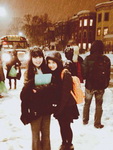Bostonian winter at Harvard University was the setting of our second debate tournament for the season. Our goal was to take on the Harvard International Forensics Tournament, one of the most renowned and highly regarded competitions of its kind. Being the sole team from YK Pao School, Headmaster Wu had called to wish us luck before our departure, saying that there needn’t be any pressure and to do our best. With those words, our journey began.
Shanghai High School, High School Affiliated to Jiaotong University, Weiyu High School, High School Affiliated to Renmin University, and High School Affiliated to Fudan University collectively dispatched more than 40 students from over 20 teams to participate in the tournament. This year, more than a thousand students from all countries and ethnicities gathered to affirm or negate that “economic globalization benefits worldwide poverty reduction.” In our division, the Public Forum, the choice of Affirmation or Negation would be decided with the toss of a coin, usually conducted by the judge shortly before the start of a debate. The team that guessed correctly proceeds to choose a side.

On February 13th, T-minus eight hours to the first round, the yellow pools of light from the Crown Plaza Hotel’s conference room illuminated dozens of determined faces. The precariousness of the next day’s four rounds loomed heavily over the room: more than 330 were competing in the Public Forum division with us.
Tracy, the first speaker, went tirelessly through her constructive speech to purge every last imperfection. She rehearsed, timed, edited, and rehearsed again. In her four minute speech, a maximum of three contentions can be presented.
In the first round, we were up against the Korean International School. During the opening, we used the World Bank’s definition of poverty as “living under $1.25 per day,” and cited the Collins dictionary to define economic globalization as “the emergence of a single world market since the 1980’s.”
The victory was the first of many. Even against native English-speaking debaters, we stood our ground and emerged triumphant.
Later that day, when the Chinese delegation had swept six of 20 Best Speakers awards, and the Koreans an additional three, Benson, the leader of the delegation, reminded us not to worry. “There's no use dwelling on the past," he advised. “Stay optimistic, and be sure to enjoy Boston.”
The next day, the former 330 or so teams had been cut down to less than 10%. Tracy and I were fortunate enough to be amongst them.
What I have learned from debating in both Chinese and English is that there is a fundamental difference between the two— the overwhelming importance of solid evidence in English debates. Chinese debaters tend emphasize linguistic flair, with abundant poetry and aphorisms in speeches. They weave an intricate webs of logic to trap opponents, and cite sources such as novels or other works of literature. Such sources are considered unreliable in English debates, where a debater usually cites sources such as government, authoritative NGOs, researches conducted by qualified scientists or scholars. While logic is also important, seeking to rebut a contention using only logical fallacies would be unfeasible. Logic and evidence are both essential.

With those lessons learnt and experiences concluded, we made it as far as the semi-finals before the Beijing team emerged victorious. Our comrades Boreas and Rosalind from High School Affiliated to Renmin University secured the championship, while British Columbia School were the runners-up. YK Pao School took third place. We did well, with Tracy being awarded 10th place as Best Speaker and myself in 7th place, and we were so close to the championship. I am confident that should we be back next year, we would achieve more.
The frequent tournaments and the unpredictable nature of the outcome has hardened our resolve. As the famous historian Zhu Weizheng once said: “One can never hope for victory without preparing for defeat.” Through debate, we had harvested knowledge, team spirit, and the guidance to pursue an unswerving path along the Confucian “middle course.”
(From Clementine, Y10)